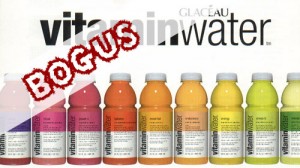Read Joe’s post here.
Anything that proclaims health benefits and is still as sweet as soda has to be a fluke. It is common sense. Yet I myself fell prey to this misleading drink two summers ago. I worked at the Maple Grove Pool at the admissions and concessions desk, and we were always well-stocked with Vitaminwater of all flavours. I noticed that it was a very popular drink as many adults who came to purchase a drink would choose Vitaminwater.
So, being curious, and also attracted by the colourful array of different flavours, the supposed effect it was supposed to give (ie: Energy, Focus, etc), and the cheeky bottle descriptions, I tried one. It tasted delicious. Yet I didn’t feel that it was “bad for me” because it “contained vitamins”, so it must be good for me, right?
WRONG. I was so wrong. I drank this supposed “health beverage” all throughout the summer, and nearing the end of the summer I (finally) did some research. To my horror, I discovered that Vitaminwater is just sugar water with a couple of vitamins tossed in. That doesn’t make it healthy. It contains as much sugar as soda, yet Coca-Cola had the nerve to market it as a health product.
Joe’s post explains that Coca-Cola is being sued for their misleading advertising. I fully support this lawsuit as I believe that this is a breach of ethics on Coca-Cola’s part. Blatantly lying to customers about the fake health benefits of your product, in my opinion, crosses the line. America has a obesity problem that is not going away anytime soon, no thanks to Coca-Cola. If you are going to produce junk food/beverages, at least have the decency to state the facts, and not pretend that your product is healthy in order to lure unsuspecting customers.


